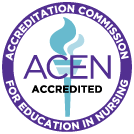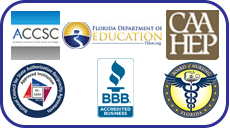CALL NOW: 561-810-8500
E-Mail: This email address is being protected from spambots. You need JavaScript enabled to view it.
Chiropractors are uniquely prepared to move through our accelerated programs and earn a Master of Science in Nursing, as a nurse practitioner, in approximately two years.
Our innovative curriculum and learning system allow qualified candidates to accelerate their pre-licensure Bachelor of Science in nursing degree with an undisrupted continuation into the Master of Science in Nursing program with a focus as a family nurse practitioner.
Successfully completing the three-semester accelerated BSN program will allow the student to sit for the licensure as a registered nurse. Then successfully, completing the MSN degree program allows graduates to sit for the family nurse practitioner certification.
Program Highlights
- Offers the qualified candidate to accelerate through the coursework to achieve a BSN and MSN FNP.
- Online coursework providing a flexible schedule to complete assignments, at the student’s convenience 24/7, for each module during the term.
- Clinical scheduling opportunities that may be scheduled with minimal disruption to the students’ work schedules.

The Associate and Baccalaureate Nursing programs at International College of Health Sciences located in Boynton Beach, Florida, is accredited by the:
Accreditation Commission for Education in Nursing (ACEN)
3390 Peachtree Road NE, Suite 1400
Atlanta, GA 30326
(404) 975-5000
The most recent accreditation decision made by the ACEN Board of Commissioners for the Associate and Baccalaureate Nursing programs is Continuing Accreditation.
View the public information disclosed by the ACEN regarding this program on the ACEN website.
PROGRAM DESCRIPTION
Accelerated Bachelor of Science in Nursing
- 120 Semester Credits;
- 12 Months (Full-time);
- 24 Months (Part-time).
The Accelerated BSN program develops the student’s ability to analyze and apply research and evidence-based practice models into various healthcare environments. Through the application of theory, research, and translation of outcomes, the student will analyze clients, community, public health,
technology, aging, and vulnerable populations with a focus on healthcare quality, safety, and improved outcomes. This program prepares the graduate to become a licensed registered nurse and to seek employment opportunities within the field of nursing.
Master of Science in Nursing Family Nurse Practitioner
- 40 semester Credits;
- 16 Months Full-Time;
The Family Nurse Practitioner (FNP) program is designed to expand the knowledge of the nurse as it relates to the role of the family nurse practitioner and advanced nursing practice. Family nurse practitioners serve as the primary health care providers in many diverse practice settings including, but not limited to, private medical offices, health clinics and acute care settings. The Family Nurse Practitioner program integrates theory and practical application through lecture, laboratory, and clinical experiences to address a wide range of primary care needs, order diagnostic tests, apply evidence-based research when caring for the family and manage common acute, chronic health problems of individuals from infancy through late adulthood. The FNP program focuses on developing the knowledge and skills necessary to deliver nursing care to persons of all ages across primary care settings. This program prepares the successful and licensed graduate for an entry level position as an advanced practice nurse.
Upon completion of the graduate program, the graduate will be able to:
- Integrate nursing and related sciences into the delivery of care to clients across diverse healthcare settings;
- Create effective interdisciplinary organizational and systems leadership in the care of the client in diverse healthcare settings;
- Analyze quality initiatives to improve health outcomes across the continuum of care;
- Apply practice guidelines to improve practice and health outcomes;
- Relate information and communication technologies to document and improve health outcomes;
- Examine the effect of legal, ethical, and regulatory processes on healthcare delivery, practice, and health outcomes;
- Employ collaborative inter-professional strategies for improving client and population health outcomes;
- Evaluate the effectiveness of clinical prevention interventions that affect individual and population-based health outcomes, perform risk assessments, and design plans or programs of care;
- Relate knowledge of illness and disease management to providing evidence-based care to clients, communities, and vulnerable populations in an evolving healthcare delivery system.
End of Program Student Learning Outcomes
Upon completion of this program, the graduate will be able to:
- Integrate the knowledge and methods from a variety of disciplines to inform decision making;
- Apply basic organizational and systems leadership for quality care and client safety;
- Integrate scholarship for evidence-based practice into the care of the client;
- Use information management and application of client care technology;
- Examine policy, finance, and regulatory environments in healthcare;
- Incorporate inter-professional communication and collaboration to improve client health outcomes;
- Use clinical prevention and population health principles to improve the care of the client;
- Demonstrate professionalism and professional values in the care of the client;
- Integrate knowledge and skills across the lifespan and in the continuum of healthcare environments in the care of the client.
DEGREE PLAN
Accelerated Bachelor of Science in Nursing
Program Outline
The Accelerated BSN program includes General Education courses that are transferred in for most students. Please see the Program Disclosures tab for a detailed list of these courses.
| COURSES | CREDITS |
|---|---|
| NUR3010 Health Assessment and Promotion * | 4 |
| NUR3025 Pharmacology * | 3 |
| NUR3031 Pathophysiology in Nursing Practice * | 3 |
| NUR3150 Care of the Client I | 4 |
| NUR3150L Care of the Client I Clinical Residency | 4 |
| NUR3210 Mental Health Nursing | 2 |
| NUR3210L Mental Health Nursing Clinical Residency | 1 |
| NUR3250 Care of the Client II | 8 |
| NUR3250L Care of the Client II Clinical Residency | 4 |
| NUR4020 Care of Women and Children Clinical Residency | 2 |
| NUR4020L Care of Women and Children Clinical Residency | 1 |
| NUR4550 Evidence Based Nursing Practice * | 3 |
| NUR4050 Care of the Client III | 8 |
| NUR4050L Care of the Client III Clinical Residency | 4 |
| NUR4250 Professional Nursing Integrations | 9 |
| TOTALS | 60 |
| * If you are a licensed chiropractor you may elect to take NUR5018, NUR5024, NUR5028, and NUR5046 instead of NUR3010, NUR3025, NUR3031, and NUR4550. These courses will qualify for transfer credit into the Master of Science in Nursing program. | |
Master of Science in Nursing Family Nurse Practitioner
Program Outline
| COURSES | CREDITS |
|---|---|
| NUR5018: Advanced Pathophysiology * | 3 |
| NUR5024: Advanced Health Assessment and Diagnostic Reasoning * | 4 |
| NUR5028: Advanced Concepts in Pharmacology * | 3 |
| NUR5046: Evidence Based Practice * | 3 |
| NUR6010: Primary Health Care of the Family I - Adults and Geriatrics | 6 |
| NUR6024: Primary Health Care of the Family II - Women’s Health | 3 |
| NUR6042: Primary Health Care of the Family III - Pediatrics and Adolescents | 3 |
| NUR6080: Advanced Practice Practicum I | 6 |
| NUR6090: Advanced Practice Practicum II | 6 |
| NUR6091: Family Nurse Practitioner Integration | 3 |
| TOTALS | 40 |
| * If you elected to take NUR5018, NUR5024, NUR5028, and NUR5046 in the Accelerated Bachelor of Science in Nursing program, you will be eligible to receive transfer credit, under the transfer credit policy, and start the program with the courses in Term II. | |
TECHNICAL STANDARDS
Essential Functional Abilities
The student’s health must enable him/her to fulfill the requirements and outcomes of the nursing program. International Colleges of Health Science’s nursing program requires the following as functional abilities for nursing students.
| CATEGORY | DESCRIPTION |
|---|---|
| Gross Motor Skills | Gross motor skill sufficient to provide the full range of safe and effective nursing care activities, such as moving within confined spaces, standing, and maintaining balance, reaching above shoulders (IV poles), reaching below waist (plug electrical appliance into wall outlets). |
| Fine Motor Skills | Fine motor skills sufficient to perform psychomotor skills, such as picking up objects with hands, grasping small objects with hands (IV tubing, pencil), writing with pen or pencil, keying/typing (use a computer), Pinching/picking or otherwise working with fingers (manipulate a syringe, eye droppers). |
| Physical Endurance | Physical stamina sufficient to perform client care activities for entire length of work role, such as standing during surgical or therapeutic procedures, sustaining repetitive movements (CPR), maintaining physical tolerance (work entire shift). |
| Physical Strength | Physical strength sufficient to perform full range of required client care activities, such as pushing and pulling 25 pounds (position clients), supporting 25 pounds of weight (ambulate client), lifting 25 pounds (pick up a child, transfer client), moving light objects weighting up to 10 pounds (IV poles), defending self against combative client, using proper upper strength (perform CPR, physically restrain a client), squeezing with hands (operate fire extinguisher). |
| Mobility | Physical abilities sufficient to move from place to place in a quick manner and to maneuver by twisting, bending, Stopping/squatting, moving quickly (response to an emergency), climbing (ladders/stools/stairs), walking. |
| Hearing | Auditory ability sufficient for physical monitoring and assessment of client health care needs, which includes hearing normal speaking level sounds (person-to-person report), hearing faint body sounds (blood pressure sounds, assess placement of tubes), hearing in situations when not able to see lips. |
| Visual | Visual ability sufficient for accurate observation and performance of nursing care, which includes seeing objects up to 20 inches away (information on a computer screen, skin conditions), seeing objects up to 20 feet away (client in a room), seeing objects more than 20 feet away (client at end of hall), use depth perception, use peripheral vision, distinguish color (color codes on supplies, charts, bed), distinguish color intensity (flushed skin, skin paleness). |
| Tactile | Tactile ability sufficient for physical monitoring and assessment of health care needs, which includes feeling vibrations, detecting temperature, and feeling differences in surface characteristics, sizes, and shapes. |
| Smell | Olfactory ability sufficient to detect significant environmental and client odors. |
| Reading | Reading ability sufficient to comprehend the written word at a minimum of a tenth-grade level. |
| Arithmetic | Arithmetic ability sufficient to do computations at a minimum of an eight-grade level. It includes the following three concepts: Counting: the act of enumerating or determining the number of items in a group. Measuring: the act or process of ascertaining the extent, dimensions, or quantity of something. Computing: the act or process of performing mathematical calculations such as addition, subtraction, multiplication, and division. |
| Emotional Stability | Emotional stability sufficient to assume responsibility/accountability for actions, which includes establishing therapeutic boundaries, dealing with the unexpected, adapting to a changing environment/stress, focusing attention on a task, performing multiple responsibilities concurrently, and handling strong emotions. Analytical/thinking/reasoning skills sufficient to perform deductive and inductive thinking necessary to make nursing decisions, which includes transferring knowledge from one situation to another, processing information, problem solving, evaluating outcomes, prioritizing tasks, and using short- term and long-term memory. |
| Critical Thinking Skills | Critical thinking skills sufficient to exercise sound nursing judgment, which includes identifying cause-effect relationships, planning/controlling activities for others, synthesizing knowledge and skills, and sequencing information. |
| Interpersonal Skills | Interpersonal abilities sufficient to interact with individuals, families, and groups respecting social, cultural, and spiritual diversity. This includes the ability to negotiate interpersonal conflict, respect differences in clients, establish rapport with clients, establish rapport with coworkers. |
| Communication Skills | Communication abilities sufficient for interaction with others in written and oral form, which includes teaching, explaining procedures, giving oral reports, and conveying information through writing. This includes the ability to teach (client/family about health care), explain procedures, give oral reports (report on client’s condition to others), interact with others (heath care workers), speak on the telephone, Influence people, direct activities of others, convey information through writing (progress notes). |
| Analytical Thinking | Reasoning skills sufficient to perform deductive/inductive thinking for nursing decisions. |
This list was developed from The National Council of State Boards of Nursing, Inc. list of essential functional abilities.
PROGRAM DISCLOSURES
Accelerated Bachelor of Science in Nursing, General Education Requirements
Students must have a foundation of general education courses to successfully complete the Bachelor of Science in Nursing program. A minimum GPA of 2.5 (letter grade of C) or higher on a 4.0 scale in all general education courses is required.
The faculty appreciate diversity in learning and accept general education credits from categories as described in the general education section below. Specific courses are required as presented in the following table. Students must complete required general education courses prior to starting nursing concentration courses.
General education courses are transferred into the Accelerated Bachelor of Science in Nursing program meeting the following requirements:
| GENERAL EDUCATION (up to 60 transfer credits) | |
| Sciences Including: - Anatomy & Physiology with Lab (8 credits) - Microbiology with Lab (4 credits) - Chemistry or Organic Chemistry with Lab (4 credits) - Nutrition (3 credits) |
19 |
| English and Communications Including: - English Composition I (3 credits) - English Composition II (3 credits) - Other College level English, Writing, or Communications Courses (6 Credits) |
12 |
| Humanities Including: - College level humanities courses (6 credits) |
6 |
| Mathematics Including: - College Algebra or higher math course (3 credits) - Statistics (3 credits) |
6 |
| Social Sciences Including: - General Psychology (3 credits) - Growth and Development (3 credits) - College level social science courses (6 credits) |
12 |
| General Education Electives – College level general education courses | 5 |
Program Disclosures
Program Outcomes: Consumer Information ![]()
Licensure Requirements:
ICHS (International College of Health Sciences) cannot determine whether its nursing program meets licensure requirements in each student’s state of residence; therefore, we are providing a link to the contact information for the individual state licensing boards.
Board of Nursing Contact Information by State: https://www.ncsbn.org/membership/us-members/contact-bon.page
Enhanced Nursing Licensure Compact:
The Enhanced Nursing Licensure Compact allows for nurses to have one multistate license with the ability to practice in all compact states. Health care delivery requires that nursing care, today and in the future, be fluid across state lines. The model for state licensure that we have had is not flexible or adaptable to meet this need. However, under the eNLC, nurses can provide care to patients located across the country, without having to obtain additional licenses. Some of the benefits of the eNLC include:
- Enables nurses to practice in person or provide telenursing services to patients located across the country without having to obtain additional licenses;
- Nurses can cross state borders and provide services in the event of a disaster;
- Facilitates telenursing and online nursing education;
- Decrease expense for organizations that employ nurses and may share the cost of multiple licenses.
The enhanced NLC (eNLC) increases access to care while maintaining public protection at the state level.
For current information on the status of the eNLC please go to their site: Nurse Licensure Compact (NLC).
Source: National Council of State Boards of Nursing (NCSBN) 2023





